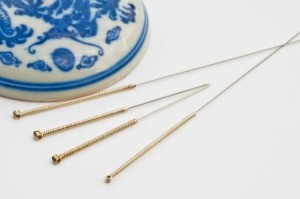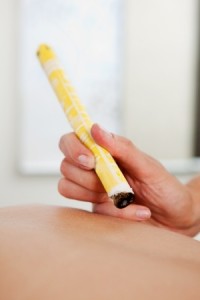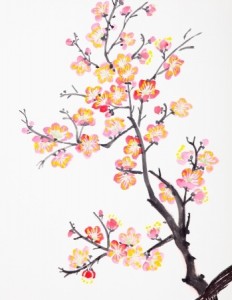Chinese Medicine is Physical Medicine (Not Energy Medicine)
I must admit, when I first learned about this magical, invisible “Qi” I was intrigued and excited. And then I was told that this Qi travels throughout the human body inside invisible energy meridians… I was hooked, how amazing! These concepts were so interesting to my Western mind. It sounded like a fairy-dust magic exists and that there is a long history of medicine to back it up. Well, sorry to disappoint the Western masses, but it turns out the energy & fairy-dust ideas are based on mistranslations from a French diplomat in the early 1900’s. In this article I will explain how Chinese Medicine is a purely physical medicine; A system based on blood flow, organ function and the health of the nervous system. In this article I will also explain how this misunderstanding occurred and why it still persists today.
 Most of this misunderstanding around Chinese Medicine being “energy medicine” started with a well-meaning French diplomat named George Soulié de Morant in the early 1900’s (his books on the topic were published in 1934 & 1939). George lived in China for many years and wrote a series of amazing books chronicling what he saw, including later works on Chinese Medicine. Unfortunately, George had no training in medicine and additionally he had no training in the ancient Chinese character system (called Seal Script) in which the classics were written. Because of George’s lack of education related to Chinese Medicine, his writings on “Qi” and the “meridian” system were fundamentally inaccurate. In addition, because there was not a great deal of interest in Chinese Medicine in Europe at the time (1940’s) there were no other experts around with opposing viewpoints.
Most of this misunderstanding around Chinese Medicine being “energy medicine” started with a well-meaning French diplomat named George Soulié de Morant in the early 1900’s (his books on the topic were published in 1934 & 1939). George lived in China for many years and wrote a series of amazing books chronicling what he saw, including later works on Chinese Medicine. Unfortunately, George had no training in medicine and additionally he had no training in the ancient Chinese character system (called Seal Script) in which the classics were written. Because of George’s lack of education related to Chinese Medicine, his writings on “Qi” and the “meridian” system were fundamentally inaccurate. In addition, because there was not a great deal of interest in Chinese Medicine in Europe at the time (1940’s) there were no other experts around with opposing viewpoints.
Paul Unschuld is probably the best known and most educated translators of ancient Chinese medicine texts. He famously wrote:
“…It should be noted that the interpretation of qi 氣 as “energy”, so widespread in TCM literature today, lacks any historical basis.”
In summary, Qi does not mean “energy” and is almost always incorrectly translated. This mistranslation leads to a fundamental misunderstanding of Chinese Medicine and how it works.
So then, what is the meaning of Qi as used in Chinese Medicine? While there are over 10  definitions of Qi in English-Chinese dictionaries, we mostly use 2 of the definitions in Chinese Medicine:
definitions of Qi in English-Chinese dictionaries, we mostly use 2 of the definitions in Chinese Medicine:
Qi = “Vital Air”, meaning the vital part of the air we breathe. What is the vital part of the air we breathe? Well Oxygen, of course. If we have reduced Qi (oxygen) then physical health will suffer.
Qi = “The Function” of something. For example, the function of the Kidney organ is called “Kidney Qi” and the function of the Stomach organ is called “Stomach Qi”. This meaning hints at perhaps the greatest gift of Chinese Medicine: a treatment method that can improve the function of the organ system. This is a complete system designed to improve health and vitality, and is fundamentally not interested in suppressing symptoms. The core treatment methods of Chinese Medicine are targeted at improving blood flow and thereby the function of the organ system (Heart, Stomach, Kidney, etc).
Qi is not the only concept that is often misunderstood in Western translations. The term “Meridian” is also problematic. In fact the most accurate term for the longitudinal pathways described in Chinese Medicine is “vessel”, not “meridian”. Meridian, as it is used in Chinese medicine, is a concept invented by inaccurate translations from the French in the 1940’s. The vessel system described in classic TCM texts is a physical system that carries blood, oxygen and nutrients throughout the body. Sounds exactly like blood vessels, huh? In modern anatomical terms, the vessel system of Chinese Medicine would simply be the vascular system. The vessel system in TCM is a network arteries which branch down to capillaries and then return to the heart as veins. Part of the confusion in understanding the “meridian” concept is that some aspects of the nervous system included in the descriptions of these vessels. This is due to the fact that the ancient Chinese physicians didn’t quite understand the nervous system as a separate entity and therefore mixed the functions of the vascular system together with the nervous system.
It should be noted that this inaccuracy doesn’t diminish the effectiveness of Chinese Medicine, it simply makes it a bit more difficult to explain its effect in Western terminology. For a physiological explanation of acupuncture, here is an article on how acupuncture works. Chinese Herbal Medicine is more obviously a physical medicine system, meaning that drinking an extract of physical herbs will most likely produce a physical effect, not an energetic one. Here is a more detailed explanation of how Chinese Herbal Medicine works.
 After graduating from acupuncture school, I spent 4 months in China, mostly studying acupuncture and herbal medicine in TCM Hospitals. There I saw first-hand that Chinese doctors don’t consider their medicine system an “energy medicine”. At the time, I was fresh out of acupuncture school so I tried at-length to engage my Chinese teachers in a discussion in the finer points of energy. However these Chinese doctors were oddly disinterested in the conversation… Although I didn’t realize it at the time, I now realize that they were trying their best not to shatter the “energy model” I had just learned in 3 years for Chinese Medicine school.
After graduating from acupuncture school, I spent 4 months in China, mostly studying acupuncture and herbal medicine in TCM Hospitals. There I saw first-hand that Chinese doctors don’t consider their medicine system an “energy medicine”. At the time, I was fresh out of acupuncture school so I tried at-length to engage my Chinese teachers in a discussion in the finer points of energy. However these Chinese doctors were oddly disinterested in the conversation… Although I didn’t realize it at the time, I now realize that they were trying their best not to shatter the “energy model” I had just learned in 3 years for Chinese Medicine school.
This experience in China hints at the interesting part of the story… Why does this energy model persist, even though it is neither supported by the classic texts or by basic intellectual reasoning. The answer here seems to be that the Chinese medical community are happy to play lip-service to the energy idea in exchange for control of the medicine itself. As long as this energy model persists then they can continue to claim Chinese Medicine as their domain. Once the Chinese doctors admit that they practice a highly effective therapy that works on the same principles as Western medicine then they risk losing control.
With all this being said, I am a supporter of Energy Medicine and I have personally seen benefits of energetic treatments in my past. Energy Medicine, in all its forms, has helped so many people and can be powerful and transformative. Some examples of Energy Medicine practices include: Reiki, Healing Touch and Crystal Healing. So I would like to be clear that I am not in any way opposed to energy medicine, instead I am writing this post to clarify the mechanism by which Chinese Medicine works. The mechanisms of Chinese medicine are physical and include: increased blood flow, improved oxygen transport, better nutrient delivery and improved nervous system function.
